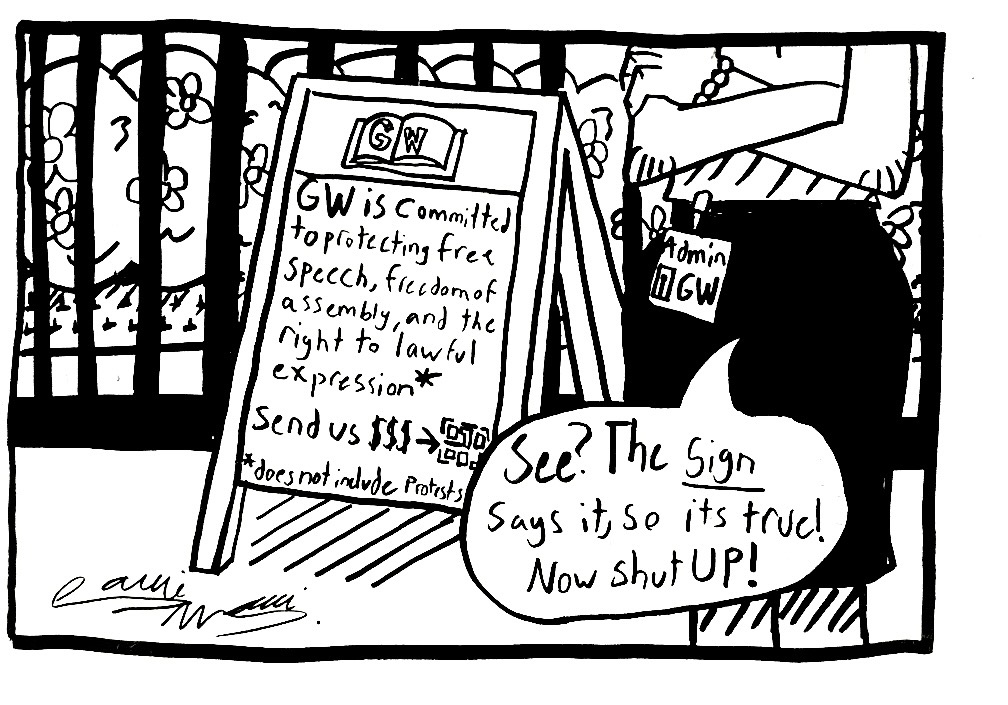There’s an old adage that goes “Nothing is ever written in stone.” At GW, this saying translates to “The syllabus is subject to change,” a line that can be found in most course outlines. But some things – like syllabi – are meant to be carved into cold, hard rock to hold both students and professors accountable.
Making significant changes to a syllabus beyond the first week of the course is the classroom equivalent of a breach of contract. According to one study, more than 74 percent of faculty members view a syllabus as a contractual agreement, and that means professors who break them should face serious repercussions – just like their students. Unfair, unilateral and often last-minute calls for drastic change cost students their time, money and sanity. So grab your hammer and chisel because it’s time that GW considers syllabi just as seriously as contracts.
[gwh_image id=”1026225″ credit=”Media Credit: Hatchet File Photo Sydney Erhardt ” align=”right” size=”embedded-img”][/gwh_image]
There are exceptions to the rule, of course. Minute changes – like adjusting lecture topics to better fit current events, pushing back a deadline a few days or cutting down the number of pages assigned to read – are all reasonable ways to alter a syllabus. For example, if the due date of a major assignment coincides with midterm exams in other classes, the due date can be moved later so long as the nature of the assignment remains the same. These modifications are acceptable as long as they are done with the consent of students or communicated to them in writing, just like any other contract.
Major changes, on the other hand, force students into a learning environment that they didn’t sign up for. When changes are made after a few weeks into the semester, students feel trapped because they can no longer opt-out of the class without financial penalties. Claire Potter, a professor of history at The New School for Public Engagement, recommends that professors “don’t add extra required readings; don’t suddenly decide not to read a book the students have already purchased; and don’t make papers due earlier than they appeared on the original syllabus” because these actions can alienate students. Above all, she recommends to professors “don’t alienate your students by adding pop quizzes.”
But countless times, I have experienced those exact examples at GW. I’ve bought $60 books that were “required reading,” only to return them to the bookstore at the end of the semester – unassigned and unused – for only $6 in return. I’ve had to attend mandatory classes on days that weren’t included on the syllabus, like a surprise make-up lecture at 10 p.m. on a Sunday. Just this year, I’ve been presented with a syllabus on the first day of class that had due dates from 2005. And until now, students like me couldn’t do anything about it.
The textbook-definition of a syllabus is an agreement of mutual obligation between instructors and students handed out on the first day of class that serves to outline learning goals, grading policies, teaching methods, required readings and due dates. A contract, on the other hand, is a binding agreement between two or more parties. The difference between these two is that a contract is legally enforceable and a syllabus is not – but that’s changed in recent years.
In a 2012 case from a New York appellate court, a student sued the university he was attending for not providing enough classroom hours, which was specified at the beginning of the academic term in the syllabus. The decision handed down stated that a college would be liable if it failed to deliver the agreed upon number of hours of instruction or to provide services in the syllabus and, therefore, obligated to refund the tuition. In total, there have been more than 80 individual students across the country who have sued colleges for tuition refunds under claims of educational malpractice, which include failure to fulfill contractual obligations in syllabi.
In order to prevent being sued for syllabus negligence, Hampton University’s Center for Teaching Excellence outlines a number of strategies. These suggestions include professors being more specific about classroom hours and course topics, inserting disclaimers and communicating changes to students as soon as possible. GW and its professors should follow Hampton’s advice to benefit students and prevent possible lawsuits, especially given the hefty price tag of the school.
“See you in court” shouldn’t be the only response to professors who violate their own syllabus. First, professors should be held accountable to their own code of conduct. In the “Class Attendance” section of the code, it states that “contributions of class attendance and participation toward course grades should be explicitly stated on course syllabi as should all factors used in determining these grades.” But this isn’t always upheld. I’ve been graded on attendance as a last-minute addition during finals week because my professor didn’t have time to read an assigned paper but still needed to account for another 15 percent of our cumulative grade. Unfortunately for me, the Faculty Code doesn’t go into detail about how students should report these offenses and the subsequent punishments for teachers. Students should be able to report this to department heads, and consequences for professors not abiding by the code should include warnings and even removal of tenure.
At the end of the day, both students and professors should be required to uphold their end of the bargain or face the consequences. The easiest way to transform college syllabi into contracts would be to simply add a piece of paper onto the end of every syllabus and require both professors and students to sign on the dotted line after the statement, “I have completely read this syllabus and understand and agree to the course requirements.”
Sydney Erhardt, a senior majoring in international affairs, is a Hatchet columnist.
Want to respond to this piece? Submit a letter to the editor.


